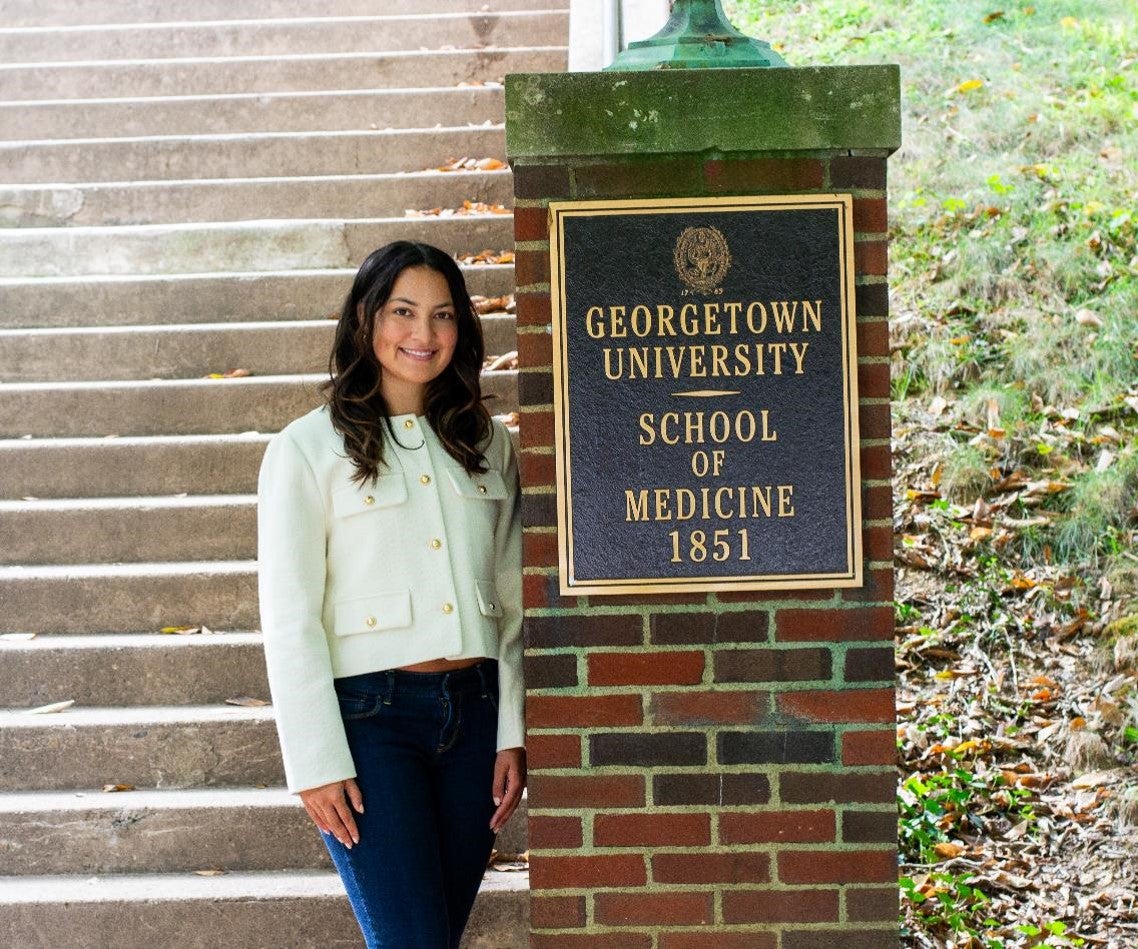Q&A with Sara DeLeon (BSPA ’25), Student Researcher at the Pellegrino Center for Clinical Bioethics

Sara DeLeon came to Georgetown with a long-held interest in the intersection of genome science and ethical policy. She further developed her focus on genetics and ethics through Biomedical Science Policy & Advocacy (BSPA) coursework, and in January 2023 she began an independent study of local genetic counseling services in collaboration with the university’s Pellegrino Center for Clinical Bioethics (PCCB).
The Pellegrino Center echoes the interdisciplinary emphasis of BSPA and other Biomedical Graduate Education (BGE) programs: Its members seek to address ethical challenges in patient care by drawing on expertise from clinical practice, philosophy, theology, law and basic science. Sara’s independent study mentor is James Giordano, Ph.D., M.Phil., chief of the center’s Neuroethics Studies Program and a professor in the BSPA program as well as the M.S. in Integrative Medicine & Health Sciences. With Giordano’s support, Sara hopes to help genetic counseling services provide testing and health plans more equitably to patients from many different backgrounds.
In this interview with BGE, Sara discusses her journey through genetics and ethics and how she plans to leverage her studies in her future career.
BGE: What inspired you to pursue an independent study at the Pellegrino Center for Clinical Bioethics?
Sara DeLeon: I wanted to personalize my graduate experience, and the Pellegrino Center for Clinical Bioethics stood out for its focus on ethical considerations and interdisciplinary solutions to complex health issues. This approach aligned perfectly with my goal of combining ethical and policy perspectives to create actionable research. Working under Dr. Giordano has allowed me to rigorously explore these interests and develop a tailored research project targeting specific gaps in genetic counseling services.
BGE: What is the focus of your independent study?
Sara DeLeon: My study addresses gaps in genetic counseling services, particularly from newborn screening to pediatric care, within the D.C., Maryland, and Virginia areas. Newborn screening is a public health program in every U.S. state that tests newborns for a range of serious but treatable conditions, such as spinal muscular atrophy, cystic fibrosis, and sickle cell disease. Early detection through a small blood sample from the newborn’s heel helps prevent severe health issues, enabling children to receive timely treatment and reach their full potential. Genetic counselors play a crucial role after a newborn screening diagnosis, providing families with support, resources, and information about genetic conditions. They help families understand the genetic basis of the condition, assess future risks, and guide medical management to ensure the best outcomes for the child.
In my study, I focus on how social determinants of health, such as socioeconomic status, cultural beliefs, and geographic barriers, impact access to these services. Using the ETR Health Equity Framework, I aim to evaluate these gaps and propose strategies to improve access, education, and continuity of care. Ultimately, my goal is to make genetic counseling services more equitable and responsive to the diverse needs of communities.
BGE: How has working closely with Dr. James Giordano shaped your research?
Sara DeLeon: Dr. Giordano’s mentorship has been an invaluable experience. He stresses the importance of balancing scientific progress with ethical responsibility, ensuring that new technologies serve humanity without increasing disparities. His insights have greatly influenced my approach to genetic counseling research, particularly in considering the broader ethical implications of healthcare policies and practices. Through his guidance, I’ve built a robust toolkit to address issues I hadn’t initially considered.
BGE: How does an interdisciplinary approach contribute to solving complex health challenges?
Sara DeLeon: Combining biomedical sciences, ethics and policy ensures that scientific advancements are innovative and socially responsible. Advancements may unintentionally exacerbate health disparities without ethical oversight and thoughtful policy frameworks. The multidisciplinary approach enables us to address broader societal challenges by bringing diverse perspectives and tackling access, cultural competence, and resource allocation issues more effectively, ultimately driving more inclusive health outcomes.
BGE: How has your master’s program influenced your approach to research and policy?
Sara DeLeon: [The Biomedical Science Policy & Advocacy program] has been instrumental. The program has allowed me to examine challenges from multiple angles, whether through regulatory science, law, or scientific research. I’ve developed skills in evidence-based decision-making and policy advocacy, which I plan to use in shaping health policies that reflect communities’ diverse needs while fostering innovation in the biomedical field. In my future career, I wish to focus on science policy, advocating for equitable access to healthcare and ethical regulations around emerging technologies.
Want to learn more about Biomedical Science Policy & Advocacy at Georgetown?
Georgetown’s M.S. in Biomedical Science Policy & Advocacy is not currently accepting applicants. Given the interdisciplinary applications of BSPA, students are encouraged to explore our new BSPA master’s concentrations, offered within conjunction the M.S. in Biohazardous Threat Agents & Emerging Infectious Diseases and the M.S. in Microbiology & Immunology programs. The BSPA concentration gives students a policy perspective on in-demand disciplines, and provides hands-on experience through a policy development capstone course. To learn more about the BSPA concentrations, please visit our BSPA Concentration page or contact BSPA Director Tomoko Steen.
